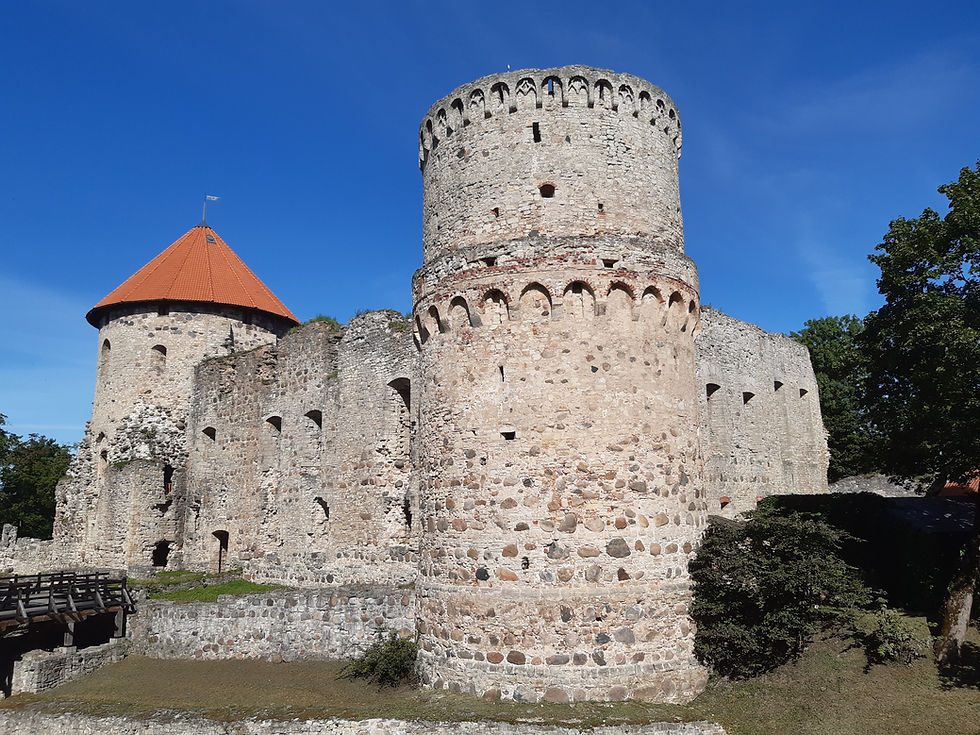Bishop Albert of Riga: Crusader, Founder, and Architect of Livonia
- byrneside
- Jun 27, 2025
- 4 min read

Bishop Albert of Riga (1165–1229), born into the noble Buxhoeveden family of Lower Saxony, was a figure of considerable ambition and vision. His legacy would permanently shape the Baltic region, particularly through the founding of Riga in 1201 and the establishment of the Livonian Crusade, part of the broader Northern Crusades. To understand Bishop Albert is to understand the transformation of Livonia (modern-day Latvia and parts of Estonia) from a land of fragmented pagan tribes to a Christian frontier governed by German ecclesiastical and military power.
Albert was born around 1165 in Bexhövede, near Bremen, in what is now northern Germany. He likely studied theology and canon law, as was expected of high-ranking clerics of his background. By the end of the 12th century, the Catholic Church had grown increasingly concerned with the persistence of paganism in northeastern Europe, especially along the eastern shores of the Baltic Sea. These lands were viewed both as spiritually bereft and strategically important. Both the German Church and Holy Roman Empire saw opportunity in converting and ultimately ruling the tribal peoples of this region.
In 1199, Albert was appointed Bishop of Livonia by Archbishop Hartwig II of Bremen. At the time, Livonia was a wild and dangerous posting. Efforts at missionary activity there had largely failed or been met with violence, and the previous bishop, Berthold, had been killed by the pagans. Christian influence was minimal and tenuous, concentrated around the mouth of the Daugava (Düna) River. Albert’s appointment was not merely religious; it was a political and military commission. Pope Innocent III sanctioned Albert’s mission as a crusade, placing it on par with the campaigns in the Holy Land. This papal blessing provided Albert with a powerful incentive to recruit warriors from the German lands: spiritual merit and indulgences were offered to those who took up the cross and joined the Baltic campaign.
Recognizing that peaceful proselytizing alone would not be enough, Albert organized a powerful military contingent. In 1202, he founded the Order of the Brothers of the Sword (Fratres Militiae Christi), a knightly order modeled on the Templars and Hospitallers, with the explicit aim of converting – by force if necessary – the pagans of the region. This combination of religious mission and military force marked a turning point in the Northern Crusades. Conversion would henceforth be accompanied by conquest and colonisation.
Albert’s most enduring legacy is the foundation of the city of Riga in 1201. Located close to the mouth of the Daugava River, Riga was ideally situated for trade and military control. Albert saw the city's potential as a Christian stronghold and a gateway to the Baltic interior. He encouraged German merchants, craftsmen, and settlers to establish themselves there, creating a thriving colonial outpost that would eventually grow into the most important city in the eastern Baltic. Albert himself laid the foundations of Riga’s cathedral and bishopric, and under his leadership, Riga became not only a military base but also a hub of administration, trade, and religious authority.
The early years of Albert’s mission were marked by constant warfare. The native Livs, Letts, and Estonians resisted the incursion with ferocity. However, the superior organisation and weaponry of the German crusaders gradually tilted the balance. By combining diplomacy, marriage alliances, and ruthless military campaigns, Albert and his forces subdued much of the region by the 1220s. He negotiated with both local chieftains and distant rulers, forging agreements with Denmark and the Papacy to secure his authority. He also sought to bring his territories under the direct protection of the Holy Roman Empire, and in 1225, he was rewarded when Emperor Frederick II granted him the status of Prince of the Empire.
Despite his successes, Albert’s rule was not without conflict and controversy. His aggressive expansionism brought him into repeated clashes with both secular and ecclesiastical authorities. The Order of the Swordbrothers, initially his instrument of control, gradually became an autonomous power and increasingly pursued its own interests. Moreover, Albert’s methods, particularly his use of military force for conversion, have since raised many ethical questions. However, to his contemporaries he was a visionary leader fulfilling a divine mandate.
Albert died in 1229, likely in Riga, having spent three decades transforming Livonia from an obscure frontier into a Christian territory recognized by Rome and the Empire. His death marked the end of an era, but the structures he established endured. Riga would grow into a major Hanseatic city, and the ecclesiastical principality he created would last until the Reformation.
In modern Latvia, Albert remains a complex figure. To some, he represents the foreign imposition of Christianity and Germanic rule upon the native peoples. To others, he is seen as the founder of Riga and the bringer of Western civilization and literacy to the region. His role in the destruction of pagan culture is undeniable, but so too is his impact on shaping the political and religious landscape of the Baltic.
Ultimately, Bishop Albert of Riga was a man of his time – a churchman who wielded the sword as well as the cross, a coloniser whose ambition was cloaked in the language of salvation. His life reflects the contradictions of medieval Christendom: the drive to spread faith paired with a hunger for power, the fusion of spiritual ideals with military conquest.
Whatever judgment history may pass, his mark on the Baltic world is undeniable.




Comments